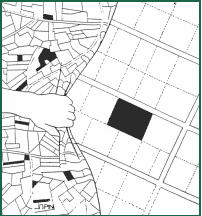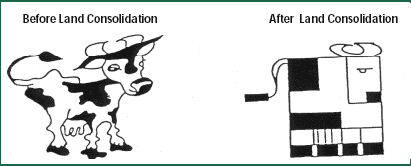U.S. Department of Transportation
Federal Highway Administration
1200 New Jersey Avenue, SE
Washington, DC 20590
202-366-4000
The European compensation model is broader than the one we know in the United States. The compensation package in the four European countries visited includes provisions for payment for land acquired, damages to remaining property, and relocation reimbursements. In addition, greater consideration is given to reimbursement of claims for impacts to properties situated outside the project.
Compensation for Acquisition of Right-of-Way
All of the countries visited have procedures in place to compensate property owners for acquisition of private property for public purposes. These processes vary from country to country, depending on laws and customary practices.
This is similar to the United States, where compensation depends on the laws of the State in which a State or local agency is acquiring property. Alternatively, the U.S. Government acquires property according to Federal laws and regulations.
A common denominator in both European and U.S. compensation models is estimation of the fair market value of the property being acquired. This concept serves as the basic criterion for formulating a fair offer to the property owner for negotiation purposes. In the United States and Europe, laws, regulations, customary practice, and implementing procedures further refine the concepts of fair market value and just compensation, creating unique situations in each country.
What is compensable is an issue in both the United States and Europe. There is little debate in the United States that compensation is in order when there is a direct physical taking of property. European models are similar, although some go much further. Nuances that come into play in handling the effects of an acquisition include:
In the United States, Federal laws pertaining to federally assisted property acquisitions by States or local public agencies recognize and allow differences among various State laws, but require States and local public agencies to pay compensation based on both Federal and State constitutional requirements.
The United States does not have national uniformity in how just compensation is calculated or paid, except that the property must be appraised and an offer made based on the concept of fair market value. While all States will meet the constitutional requirement of just compensation, some States also will compensate for other damage elements.
Compared to acquisition compensation, relocation assistance services and benefits are more uniform in the United States because most States did not have such requirements before 1971. At that time, a Federal law was enacted that requires a minimum threshold of benefits and services for projects involving Federal funding. All States now administer programs that comply with Federal requirements when Federal funds are involved. Most States follow the same procedures when Federal funds are not involved, although some have a dual standard that allows them to operate differently if no Federal funding is involved. In addition, some States have enacted relocation assistance laws and programs that go beyond Federal requirements.
All the European countries visited provide relocation assistance to those displaced by the government's acquisition of property. With the exception of England, programs are less structured than those in the United States, but all generally achieve the same objective of helping the displaced family, business, or farm relocate successfully. England's program, though more structured than the others, also has elements that are general in nature.
In Norway, relocatees must find their own replacement housing, but they are given reimbursement for the cost of relocating. If they relocate from substandard housing, they are reimbursed for relocation into standard housing. If there is agreement on the value of the property taken but not on relocation costs, the owner can go to court for a determination of what reimbursement should be.
If property acquisition results in an owner having to relocate, the German government does not have to pay the difference between the value of the property taken and the price of replacement property. Programs are available, however, to pay supplements and cover the cost of interest payments on loans taken out to buy new property.
The Netherlands has no limit on relocation expenses, although it does limit compensation for future damages. The underlying premise is that the government must put relocatees in as good a position and condition regarding value as they were in before the acquisition. Relocation costs are included in the appraisal for determining compensation. The burden of proof of damages rests with the government. All the owner has to do is file a damage claim and a panel will review the claim and decide the acceptable amount. The panel is composed of real estate managers, attorneys, and accountants who do not work for the government. The panel's findings must be as judgment-proof as possible, so the government's lists are large and panelists are chosen carefully. The same process is used to reimburse costs for consultants.
England's legal framework offers limited possibilities for government relocation advisory services, but some relocation needs can be accommodated during the negotiation process. In some case, relocatees find it difficult to obtain necessary permits for a new location.
Compensation Claims from Outside Project
In some countries, compensation extends beyond right-of outside the project adversely affected by construction or United States, most States and the Federal Government compensation in such cases, although a trend appears to sensitivity to environmental and other impacts created by
 |
| Figure 4. Land consolidation involves pooling and redistributing land. |
The Netherlands will compensate for business interruption expropriation, as well as for the cost of noise reduction. items in England.
In all of the countries visited except England, the concept of land consolidation is used occasionally in conjunction with right-of-way acquisition. Norway's Land Consolidation Act of 1821-1859 has been amended often, most recently in 1978. Land acquired for consolidation purposes is distributed fairly to remaining landowners so they have more contiguous properties without roads going through them.
Different productivity classes of soil are taken into account before valuing land and making the consolidation and distribution. Total value of the new piece of land distributed to the landowners needs to match the value of the land taken from them. If the value of the land distributed to a farmer exceeds the value of the land taken, the farmer has to pay Norway's NPRA for the extra value. The reverse also is true.
Land consolidation involves pooling and distributing land, plan, to rearrange outdated or unsuitable layouts of land one professional and two lay people administer the program initiate an investigation, by means of a cost-benefit analysis, consolidation should be done. In Germany and the landowners is required to trigger such an investigation.
Acquisition of land by government agencies is partly for also facilitates redistribution among private owners to economic return. Land consolidation in Norway is commonly land, but not urban land. In Germany, however, the team Cologne involving considerable land consolidation that benefited both individual property owners and the city as a whole. In the countries using land consolidation, the philosophy is that it is important to develop a land consolidation plan at the same time plans are developed for a road project. In Norway, farmland cannot be purchased without permission from public authorities. The government does not need a permit to buy a farm, but will generally pay 20 to 25 percent more than the market value of the property to carry out a land consolidation. In general, landowners in the countries visited were pleased with the land consolidation concept. In most cases, they prefer to have land instead of monetary compensation, and land consolidation enables them to achieve farms with better layouts. Because of the way farmland has been divided over the years in Norway, a farmer may own several noncontiguous pieces of land. Land consolidation can concentrate a farm into one or two fields with no road through it.
 |
| Figure 5. Land consolidation enables property owners to achieve farms with better layouts. |
| << Previous | Contents | Next >> |